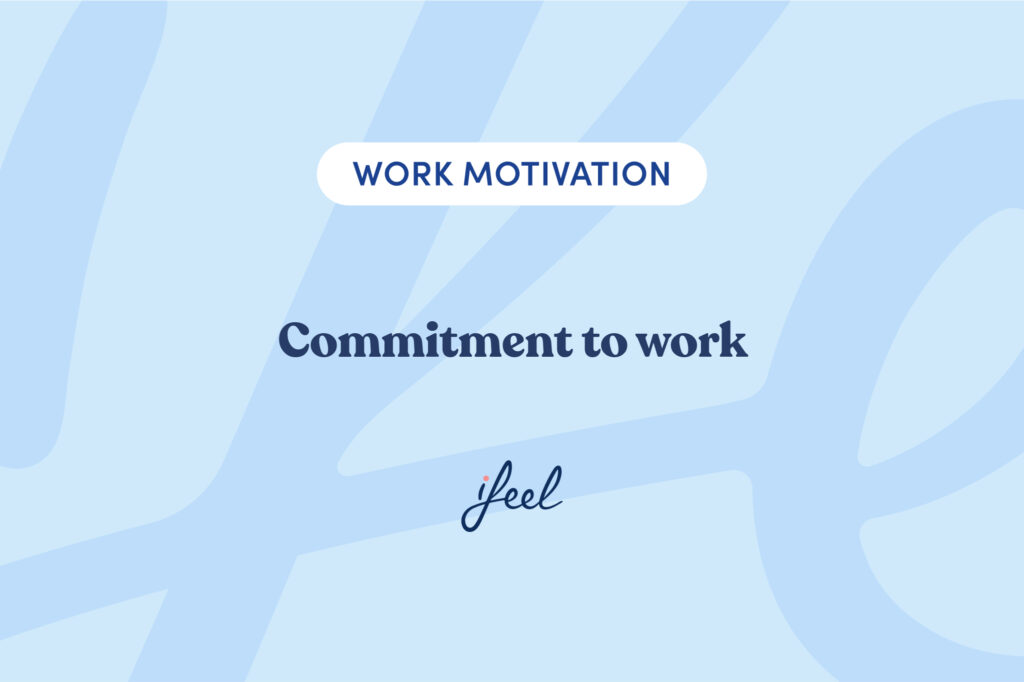Commitment to work is the emotional bond that keeps employees engaged and dedicated to their company, preventing them from seeking opportunities elsewhere. For HR leaders, fostering this commitment is crucial for organisational success. Companies can enhance employee commitment and retention by leveraging tailored advice and support through mental well-being solutions, such as those developed by ifeel’s team of psychologists.
As an HR leader, how do you foster commitment to work in your organisation?
Understanding commitment to work
Commitment to work is a connection that motivates employees to remain with the company, not out of necessity but because they genuinely want to contribute to its success. Commitment can vary in intensity and duration and often evolves over time. Employees may commit to specific tasks or projects or choose to stay with the company for strategic reasons, recognising the mutual benefits of their continued involvement.
A high employee commitment directly impacts productivity and reduces absenteeism, leading to significant cost savings for organisations. According to Gallup’s latest study, disengagement costs the global economy approximately $8.8 trillion annually.
Committed employees are more likely to go above and beyond in their roles, delivering higher-quality work and contributing to a positive work environment. This increased productivity and reduced absenteeism translate into lower costs related to recruitment, training, and lost productivity. By fostering a culture of commitment, organisations can achieve sustainable growth and success.
Fostering commitment to work
Here are key strategies to create an environment where there is commitment to work:
| Strategy | Description |
|---|---|
| Social benefits | Offer comprehensive benefits that support employees’ well-being and work-life balance. |
| One-on-one meetings | Conduct regular one-on-one meetings to understand employee needs and provide personalised support. |
| Open communication | Foster a culture of transparency and open communication to build trust and engagement. |
| Recognition programs | Implement recognition programs to celebrate achievements and reinforce positive behaviors. |
| Professional development | Provide opportunities for career growth and skill enhancement to motivate employees. |
“I can guarantee that there is an unshakable faith in the ifeel method and a support that results in more motivation, therefore more recognition, productivity and a sense of belonging to the organization from the employees since we started with ifeel“.
– Vasco Armés, Head of Human Resources at PERI Iberia

Benefits for employers and employees
Commitment to work through a supportive and growth-oriented workplace brings significant advantages for employees and employers. The table below outlines key benefits that enhance employee well-being and satisfaction and drive organisational success through improved productivity, retention, and innovation. This mutual gain underscores the value of investing in a positive workplace culture and employee development.
| Benefit | For Employees | For Employers |
|---|---|---|
| Enhanced job satisfaction | Employees experience greater fulfillment and purpose in their roles. | Employers benefit from increased productivity and reduced turnover. |
| Improved mental health | Access to mental health resources reduces stress and burnout. | Healthier employees lead to fewer absences and lower healthcare costs. |
| Career growth opportunities | Employees have clear paths for advancement and skill development. | Employers build a skilled and loyal workforce, enhancing innovation. |
| Stronger workplace culture | Employees feel part of a supportive and inclusive community. | Employers see improved morale and a positive organisational reputation. |
Mental well-being trends report
Explore the latest trends in workplace mental well-being with ifeel’s Mental Well-being Trends Report. This comprehensive report reveals that prevention is the cornerstone of effective mental health strategies in the workplace. With stress, anxiety, and burnout on the rise, fostering a supportive environment can increase productivity by up to 12%, according to the Mental Health Foundation. However, 57% of employees seek help only after suffering for over a year, highlighting the critical need for early intervention.
Ready to make mental well-being a priority in your company? Download the full report now and discover actionable insights to transform your team’s productivity and health.
The Leadership Lens🔎
Leaders play a pivotal role in fostering a culture of commitment to work. Through their vision, actions, and communication, leaders set the tone for what employees can expect and aspire to achieve. When leaders actively promote inclusivity, transparency, and support, they create an environment where employees feel valued, leading to deeper loyalty, higher productivity, and shared success.
HR leaders must consider: Are we doing enough to nurture our employees’ commitment and engagement? By continuously evaluating and enhancing strategies to foster commitment, leaders can ensure their workforce remains motivated and aligned with the company’s goals.
Trust the experts
At ifeel, we know that creating and fostering commitment to work is not easy, but once it is achieved, the benefits are transformative for both employees and employers. A committed workforce is more motivated, productive, and resilient, contributing to a positive workplace culture and driving organisational success.
To support companies in this process, our team of expert workplace well-being psychologists has created a mental well-being solution for businesses that improves talent retention, reduces presenteeism, and combats employee stress.
With our mental well-being solution, your company’s HR managers can receive personalised, data-driven advice on improving mental health at work. In addition, this solution offers employees a 360° mental well-being service structured at different levels according to their needs. Try our solution now to see how it could help you.
We hope you found this article on commitment to work interesting. If you would like more information about our mental well-being solution for companies, simply request it, and we will contact your team as soon as possible.










